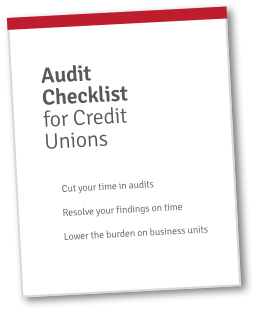It’s generally understood that audits are not fun. You already spend a significant amount of energy and resources to keep your credit union operating efficiently. One of your primary goals is accurate bookkeeping. In theory, as a credit union, you’re one of the best prepared for tests or inquiries into assets and transactional inquiries. Nevertheless, audits require stringent organization and practices.
Organizational Tools
When you’re trying to present your best work for inspection, you’ll do best if you have the right tools for the job. For example, if you’re hosting a dinner party and you want to tidy up first, you could take to your rug or carpet with tweezers to remove lint and debris, or you could whip out your trusty vacuum cleaner. Sure, it’s possible to clean your floor manually, but it’s much faster and easier with the right tools.Similarly, it’s very possible to keep tight, accurate records on a spreadsheet or with sticky notes, but you’d be better served by a system that has been specifically designed to organize pertinent information for audits.
Having the right tools on hand for an audit or exam can help you better understand what information the external party wants, who they want it from, and on what timeline.
Information Across Multiple Departments
One of the harder aspects of audits is organization. Communicating and coordinating across multiple departments is necessary for presenting a holistic picture for the auditors.Some things you may need to keep track of include who’s collecting documents, any upcoming or outstanding due dates, or remediation of an item. It’s paramount to know who’s doing what and when. In a large credit union, there are a lot of moving parts. Maintaining standards, order, and organization among all those moving parts is key.
You’ll need a system to monitor and compile documentation. Whether or not you’ve developed internal procedures and practices to accomplish this, you’ll want supporting documents and a paper trail detailing everything you’ve done.

FREE: Audit Checklist for Credit Unions
4 key principles and 9 questions to jumpstart your audit planning. From leading credit unions.Stay Prepared
At the very least, audits take time and energy normally allotted for daily operations. At their worst, they require remediation or a long series of back and forths between parties to establish and demonstrate compliance.From the first list of questions and items the auditor wants to see, to the documentation you finally deliver, you’ll need everyone on the same page. One of the best things you can do to stay ready for an audit or exam is to stay prepared.
If documentation, paper trails, and cooperative communication are part of your business practice, it will save you time, effort, and opportunity cost when the auditors come knocking. If they’re not part of your business practice, you may lose precious hours to playing catch-up or chasing down missing pieces that have fallen through the cracks.
We think organization plays a vital role in the successful completion of audits. Maintaining a strong record of communication, collaboration, and documentation pay dividends during auditing season. To see what kind of organizational benefits RedBoard can offer, visit our website to see how we can help you meet compliance.






